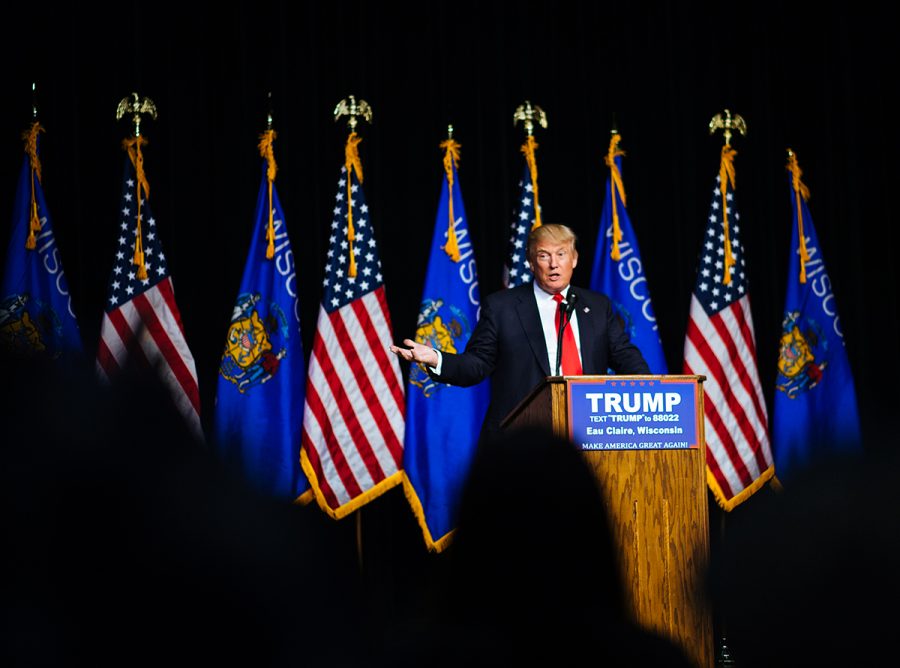Jill Stein and Hillary Clinton call for recounts in three states
Amid accusations of fraud, former candidates are seeing red
Photo by Kelsey Smith
Donald Trump visited UW-Eau Claire on Nov. 1.
November 29, 2016
Saturday into Sunday, President-elect Donald Trump took the world by storm via his favorite social media platform.
“The Democrats, when they incorrectly thought they were going to win, asked that the election night tabulation be accepted. Not so anymore!” Trump tweeted on Saturday night.
Hillary Clinton, former presidential candidate for the Democratic Party, conceded to Trump three weeks ago. Now she will participate in recounts initiated by Jill Stein, former Green Party presidential nominee, in three key battleground states: Michigan, Pennsylvania and Wisconsin.
Stein said she needs to ensure people can trust the election system. According to the Milwaukee Journal Sentinel, Stein raised $6.5 million since Wednesday, more than the $3.5 million cost for the Wisconsin recount. Stein said the surplus would be used toward “election integrity efforts and to promote voting system reform.”
Of course, Trump had a few words to say to Stein. In a statement made on Saturday, Trump claimed the recount was simply a way for her to “fill her coffers with money.”
While Stein’s reasons for initiating the recount process may vary — from raising awareness for her political efforts to bolstering her donor list — the reasoning for the Clinton campaign’s support is less certain.
Clinton’s campaign lawyer, Marc Elias, said although they had “not uncovered any actionable evidence of hacking or outside attempts to alter the voting technology,” they wanted to rule out interference because of the small margin of victory.
A margin of about 27,000 votes separated Clinton from Trump in Wisconsin. Meanwhile, they are separated by a margin of about 69,000 votes in Pennsylvania and 10,700 votes in Michigan. According to CBS News, if all three states flipped from red to blue, Clinton would win the general election with 278 electoral votes — a very unlikely scenario, according to Cook Political Report elections analyst David Wasserman.
“I’ve never seen a recount overturn margins as large as the ones we’re dealing with here,” said Wasserman.
This recount effort is coming after the Trump campaign decried the “rigged” election and accusations of Russian hackers tampering with the voting process. So while Stein and Clinton may truly be concerned with voting integrity, is it really a surprise Trump jumped on the opportunity to go offensive?
“Trump is going to be our President. We owe him an open mind and the chance to lead,” read another Trump tweet, quoting Clinton’s concession speech. He went on to lament the amount of resources it will take for the recount process, calling it “Sad.”
An editorial from the Washington Post claimed it was unfair for Trump to call Clinton out on her hypocrisy. With such small margins of victory, it would be understandable for Trump to contest the election if the roles were reversed and Clinton won the election.
But would it really?
During the third presidential debate, Trump stated he would not relinquish his right to contest the outcome of the election, although he would accept clear results.
At this point in the campaign, most of the polls showed Trump trailing Clinton, including in key battleground states, so Clinton was quick to label Trump’s comments as “horrifying.”
“The uproar over Mr. Trump’s potential unwillingness to abide by the results of the election threatens to further unravel a candidacy in sharp decline,” an article from The New York Times stated.
Of course, the candidate whose candidacy was in “sharp decline” is now our president-elect.
However unusual Stein’s and Clinton’s efforts for a recount are, it’s difficult to label them as hypocritical when at the same time, Trump took to Twitter and baselessly accused millions of people of voting illegally.
Trump also accused Virginia, New Hampshire and California of committing voter fraud, blue states with a range of margins of victory, from 2,000 to just over 4 million.
These recount efforts show the level of distrust American citizens, and even its leaders, have had in the election process, as well as the increased levels of polarization. America’s democratic process was founded on the basis of a peaceful transfer of power, so what happens when it is taken away?
Of course elections have been contested before, but it’s gotten to a point where people point fingers whenever something doesn’t go their way. Especially after one of the most contentious elections of all time, perhaps it’s not surprising either side would do whatever it takes to win.
Wisconsin’s recount will be finished by Dec. 13, the federal deadline.

